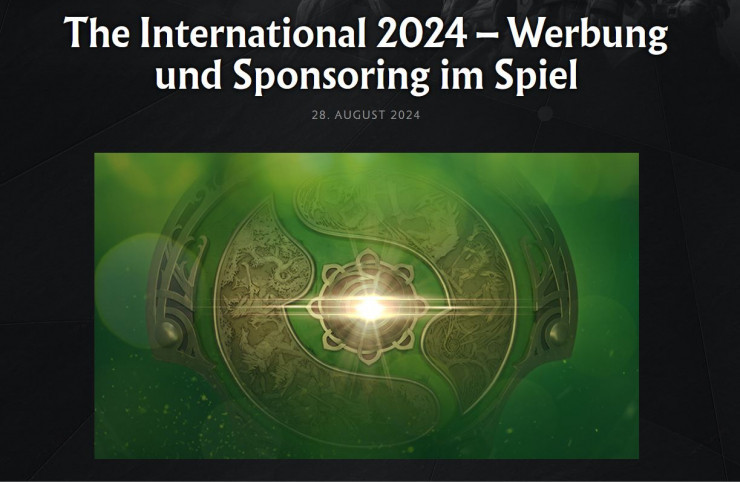No (gambling) advertising at ‘The International’ 2024 e-sports tournament

The International is considered the most prestigious championship tournament for Dota 2 ever. The current edition has been running since 4 September, with millions once again at stake. However, due to the huge popularity of the game and the e-sports event in question, it is not only the competition that is being played for huge sums of money - a lot of money is also flowing into the sponsorship contracts. The fact that no in-game advertising is permitted this year is likely to hit the teams' partners all the harder: probably because many of them come from the gambling industry.
The International (TI) is an annual world championship tournament for Dota 2 organised by Valve. The event is one of the absolute highlights of the e-sports season and has earned a legendary reputation since its launch in 2011. The competition is regarded as the most prestigious event in the Dota universe, where not only fame and honour but also huge sums of money are at stake. The prize pool is largely financed by crowdfunding, with players using the so-called ‘Battle Pass’ system to support the tournament. TI's prize money has regularly exceeded the 30 million dollar mark in recent years, setting new standards in e-sports.
The immense popularity of Dota 2 and TI is of enormous interest not only to fans, but also to sponsors. Companies from the technology, entertainment and, in particular, gambling sectors see lucrative advertising opportunities here, as the e-sports target group is often associated with an affinity for online betting and gaming. Valve's announcement in a blog post at the end of August that it would ban all in-game advertising at TI 2024 marks a turning point in the marketing of the tournament and could have far-reaching consequences for the sponsorship strategies of many teams and organisations.
Valve is not happy with the development of Dota 2 as an advertising medium
Valve has clearly expressed its concerns about the development of Dota 2 as an advertising medium in a recent blog post. While the company begins by emphasising how much it appreciates the enthusiasm of the community and the cultural value of TI, it also addresses the growing challenges that have arisen from the increasing commercialisation of the game. It particularly emphasises the role of local spectators, whose passion and commitment make the tournament so unique. Valve sees these fans as an indispensable part of TI's success and makes it clear that the focus needs to be put back on the players, the matches and the community as a whole.
As a consequence, the developer states:
‘This year we have therefore decided to remove distracting elements and put the focus back on the individual games and players. The International will no longer allow advertising and sponsorship in games. This includes team banners, team logos in the bases and abbreviations in player names.’
Strict laws on gambling advertising in this year's host country are probably not innocent in the decision
There is speculation in the international press that the strict laws on gambling advertising in Denmark, where TI is taking place this year, could be largely or at least partially responsible for the 2024 advertising ban. It is suspected that Valve wants to avoid potential legal problems, as Denmark, as the host country, has particularly strict regulations in the area of gambling advertising.
The Danish Gambling Act, which is monitored by the gambling authority Spillemyndigheden, regulates the local market and stipulates that gambling promotions must follow clearly defined guidelines.
- For example, such activities must not target vulnerable groups such as minors or people with problematic gaming behaviour. What is particularly critical here is that young people in particular naturally follow TI.
- In addition, companies are prohibited from placing misleading or overly aggressive adverts. Gambling adverts subtly packaged in abbreviations of players could cause difficulties in this context.
- Even the sponsorship of sporting events, which includes e-sports in the broadest sense, is subject to strict regulations. For example, such measures must clearly indicate a possible gambling character, which could prove difficult in the case of the advertising space in Dota 2.
The Danish regulations are likely to have been reason enough for Valve to take a more restrictive approach to advertising in TI 2024. It would be particularly problematic if sponsors from the gambling industry were to be visibly integrated into the event, which would potentially violate Danish regulations. Breaching these laws could not only have legal consequences, but also cause lasting damage to the event's image.
Conclusion
Valve's decision to ban in-game advertising in TI raises questions about the future of sponsorship agreements. Despite the announcement that the ban is effective immediately, it remains unclear whether it can be enforced in the long term. Advertising revenue is essential for many e-sports teams - and smaller organisations in particular could run into financial difficulties due to a lack of sponsorship money. In-game advertising is also a key factor in e-sports in order to appeal directly to the highly digitally savvy audience.
Valve is fully focussing on the integrity of the game in 2024, although it remains to be seen whether economic interests will loosen this direction - and ultimately the advertising ban - in the future. In view of the increasing competition in e-sports and the growing importance of sponsorship in the industry, the pressure to revise this decision is likely to increase. It remains to be seen whether Valve will find a middle ground that takes into account both the commercial and integrative interests of the Dota 2 universe.
Image source: Screenshot von https://www.dota2.com/newsentry/4247544173402144047

0 Comments to: No (gambling) advertising at ‘The International’ 2024 e-sports tournament
write a commentOur community thrives on your feedback - so let us know what you think!
Would you like to write comments on GambleJoe yourself? Then just create a GambleJoe User Account.